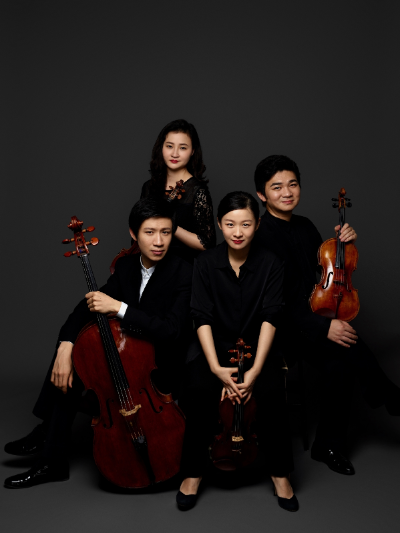 |
|
Amber Quartet [Photo provided to China Daily] |
The quartet concert on Nov 20 will feature six music pieces, which "are meaningful to the members of the quartet", as Yang says, including Mozart's String Quartet No 17 in B-flat major, K 458, nicknamed The Hunt, Debussy's String Quartet in G minor, Op 10, Mendelssohn's String Quartet No 6, Op 80, and The Dream of the Red Chamber Capriccio by Chinese composer Wang Liping.
"These works have accompanied the quartet from the very beginning. We learned to play as a quartet thanks to those pieces," says Yang who, during the concert, will introduce each piece and share personal stories about how it relates to the quartet.
"When the Amber Quartet was born, there were hundreds of quartets formed by fellow students at our school," he adds. "But now, only we are still playing together. We feel proud."
In the concert on Dec 20, the quartet will perform music pieces by Beethoven, marking the 250th anniversary of the German composer's birth. Programs will include String Quartet No 1 in F major, Op 18, String Quartet No 8 in E minor, Op 59, No 2 and String Quartet in F major, Op 135.
Beethoven composed 16 string quartets. "We chose to play the string quartet pieces the composer wrote in the final years of his life, which are like the last words he wanted to say to the world," says Ning. The String Quartet in F major, Op 135, which was the last complete work Beethoven composed, only a few months before his death in March 1827, "exposed his emotions to us in a very profound way that words could never express".
In early 2013, the Amber Quartet was honored as the first chamber music group to receive funding from the government for overseas studies - the group was accepted to study for two years at the Institute International de Musica de Camara de Madrid in Spain, with mentoring guidance by established musicians, such as Guenter Pichler from the Alban Berg Quartet.
That same year, the quartet won three awards at the Asia-Pacific Chamber Music Competition in Melbourne: the Grand Prize, the Dame Elisabeth Murdoch Prize, and the Hamer-Tribe Trust Prize. It was the first Chinese quartet to win a string of three prizes at an international chamber music competition.
They have won critical acclaim from international media and reviewers. "Their performance involved hitting and slapping their fingerboard, as well as the unusual technique of bowing between the hand and the scroll which produced a haunting sound," according to ABC Classic FM's review on their performance during the competition in Melbourne.